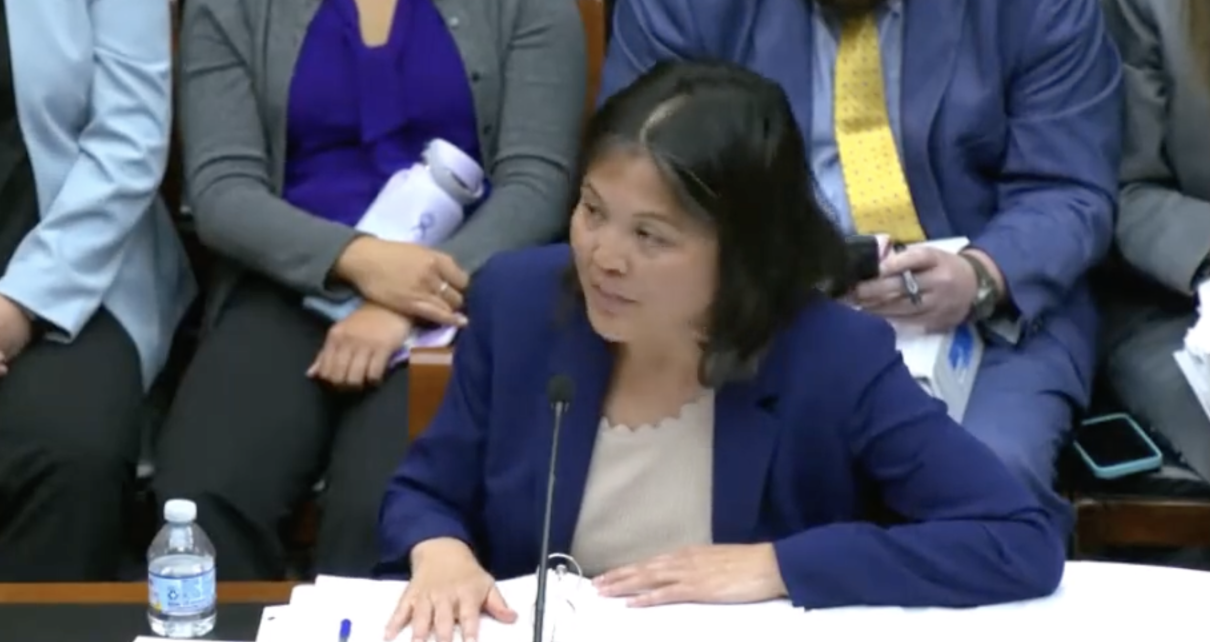
Acting Labor Secretary Julie Su. (Photo: House Committee on Education & the Workforce)
GAO Reviewing Su’s Secretary Status
The office will determine if Su can be ‘Acting’ Labor Chief indefinitely
By Thomas Buckley, July 17, 2023 5:17 pm
The federal General Accountability Office (GAO) has begun a review of the legal status of Acting Secretary of Labor Julie Su’s continuance in the position.
In other words, the GAO will determine exactly how long Su – whose nomination for the permanent gig is currently on razor-thin ice in the Senate – can remain “acting” secretary without it being made permanent.
The decision to make that determination comes in response to a request from the chair of the House Committee on Education and the Workforce Rep. Virginia Foxx (R-NC). While it is the Senate that must approve or deny Su’s nomination, Foxx’s committee oversees the day-to-day operation of the Department of Labor from the House side.
Su is most well-known to Californians as the zealous enforcer of the anti-freelancer labor law known as AB5 and for being in charge of the state unemployment agency while it negligently firehosed $40 billion out to fraudsters during the pandemic.
Notwithstanding, President Joe Biden made her the deputy secretary of labor under Marty Walsh. When Walsh left in February, Su was both nominated by Biden for the secretary slot and became the secretary on an “acting” basis pending the approval of her nomination.
But Su’s current status is rather unique in the annals of big DC jobs. Typically, “acting” officials have time limits on the duration of their service time. However, as deputy secretary she can fill the role of secretary until someone – her or someone else – gets the job permanently.
Or so conventional wisdom goes.
Foxx is asking the GAO to look at a potential conflict between federal laws governing vacancies.
“As her nomination to become the next Secretary of Labor continues to languish in the Senate, questions regarding the length of time she can remain the head of the Department of Labor need answers. Therefore, the Committee is examining the ability of an Acting Secretary of Labor to remain in office in accordance with the Federal Vacancies Reform Act of 1998,” Foxx wrote to the GAO requesting the review. “The Committee is aware of a potential conflict between two federal statutes regarding an Acting Secretary of Labor’s tenure: 1) the statute that created the position of Deputy Secretary of Labor and 2) the Vacancies Act. The Committee requests that the Government Accountability Office issue an opinion about what legal authority determines an Acting Secretary of Labor’s tenure in office and DOL’s adherence to that statute.”
Foxx said she was pleased that GAO has expeditiously determined it will proceed with the Committee’s request. That being said, regardless of what GAO determines, Julie Su can’t run from her objectively poor record. Her rap sheet is long – workers and job creators deserve better.”
This issue has become even more important in the past few days, as Democrat West Virginia Sen. Joe Manchin declared he will not vote to confirm Su permanently. That means that if Su losses just one more Democrat – a real possibility with at least three senators very much on the fence – her nomination is toast.
With Manchin saying no, the pro-Su DC chatter increased, with the “well, even if she doesn’t get confirmed she can stay in the job anyway so it’s not thaaat big a deal” being bandied about.
“I hope she has the votes to become the secretary. If not, of course, she should stay where she is,” Sen. Bernie Sanders (I-Vt.), the chair of the Health, Education, Labor and Pensions (HELP) Committee, told NBC News recently. “She’s doing a great job. Why would you not?”
On the flip side, others have wondered how it could be possible proper for someone who had been rejected by the Senate be allowed to keep their job anyway?
It is that specific issue – an issue that would be moot if Su could garner enough senate support – the GAO will examine.
While the GAO opinion is not necessarily legally binding, if it finds she is time-limited (210 days is the typical “acting” limit) it is possible that, at the very least, any regulation Su proposes and/or action she takes after that 210-day limit – which ends in October -could be challenged in court as potentially unlawful.
When the GAO determination will be made – nor when the Senate will vote on Su – is not yet known.
- Benefit Fraud Problems and Solutions - November 7, 2024
- A Little Exit Poll - November 5, 2024
- Tomorrow’s Headlines Today! - November 5, 2024




